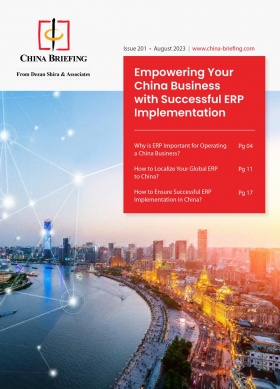Q&A: Key Points Regarding Dividends Derived by Non-Resident Enterprises in China
We answer some of the most frequently asked questions that non-resident enterprises may have when obtaining dividends from China.
Every year after the annual corporate income tax (CIT) reconciliation season, many companies may decide to distribute and remit the dividends to their overseas investors in the following months. Nevertheless, before being able to make the payments, there are a series of tax and bank formalities that need to be satisfied. We answer the most frequently asked questions that non-resident enterprises may have when obtaining dividends from China.
Q1. What are non-resident enterprises and what tax payment obligation do they have for corporate income tax?
A non-resident enterprise under Chinese tax laws refers to an enterprise lawfully incorporated pursuant to the laws of a foreign country (region) that has an office or premise established in China but has no actual management functions performed in China, or an enterprise that does not have an office or premises in China but has income derived from or accruing in China.
For non-resident enterprises with established offices or premises in China: If income is derived from such offices or premises in China or where the income obtained from sources outside China has a substantive connection to these established office or premises, the standard CIT rate of 25 percent applies.
For non-resident enterprise lacking an established office or physical presence in China: When the income generated or accrued does not have a substantive connection with an established office or physical premises—such as dividends obtained by non-resident enterprises—the CIT is only applicable to the income derived from or accrued within China. The applicable CIT rate stands at 20 percent, though it is presently reduced to 10 percent.
Q2. How to decide the taxable amount of income for gains from dividends derived by or accruing to a non-resident enterprise?
The taxable amount of income from dividends, bonus, or other returns on equity investment shall be the total amount of gains or income, encompassing all payments and associated expenses received by the non-resident enterprise from the payers.
A payer refers to a unit or individual that is directly obligated to pay relevant amounts to a non-resident enterprise in accordance with relevant laws or contracts.
Q3. Who is obliged to file CIT return for dividends derived by non-resident enterprises?
According to relevant tax laws and regulation, CIT on dividends derived by non-resident enterprises should be withheld at the source and the payer shall be the withholding agent.
The tax amount for each payment made or currently due and payable shall be withheld by the withholding agent from the amount being paid or due.
Nevertheless, in cases where the withholding agent fails to withhold or is unable to fulfill the required withholding obligation as per legal requirements, the non-resident enterprise is responsible for declaring and remitting the applicable CIT to the competent tax authority in the jurisdiction where the income is generated. Furthermore, they must complete the Report Form of the People’s Republic of China on the Withholding of Corporate Income Tax.
Q4. When does the withholding obligation occurs?
Where the income to be withheld from the source of the non-resident enterprise is dividend, bonus, and other equity investment income, the date on which the relevant tax withholding obligation occurs is the date on which the dividend, bonus, and other equity investment income are actually paid or the agreed due date of payment.
The withholding agent shall withhold the tax on the date of actual payment of the dividend income and declare and pay the withholding tax to the local competent tax authority within seven days from the date of occurrence of the withholding obligation.
Q5. How to decide the place of tax payment for dividends derived by non-resident enterprises?
For income from dividends, bonus, or other returns on equity investment, CIT shall be withheld and paid to the in-charge tax authority of the withholding agent, which is usually the tax authority in charge of the payer.
Q6. How to decide the taxable income amount when the payment is made in foreign currency?
Where the amount paid or due to be paid by the withholding agent is in a currency other than the China Yuan (RMB), the taxable income amount of non-resident enterprise shall be based on the RMB amount converted from the foreign currency in accordance with the central parity rate of RMB exchange rate published by the State on the date of withholding. The date of withholding is usually the date of actual payment or the agreed due date of payment.
Q7. What kind of documents and information should be provided by non-resident enterprises?
Generally, the following information or documents are required when filing CIT returns with the tax authorities, either onsite or through the online channel:
- Relevant contract information registration regarding the dividend payment
- Information Report on Non-resident Taxpayers Claiming Treaty Benefits (for non-resident taxpayers from country or regions that have a valid tax treaty with China)
- Outbound payment filing (if the amount of single payment for dividends exceeds US$50,000)
- Withholding tax declaration forms
- Other documents relevant to the dividend distribution such as the resolution made by the board
To be noted, the undistributed profit of the payer must be an audited amount Moreover, starting from 2017, there is no longer a requirement for the relevant contract to be filed within 30 days of its signature.
Meanwhile, in practice, before the bank processes outbound payments, enterprises will need to provide tax payment proofs to the bank.
Moreover, after the completion of tax-related matters and foreign exchange payments, the tax authority will ask the enterprise to provide supporting documents for ongoing regulatory supervision.
Q8. What kind of follow-up inspections shall be made by China tax authorities?
According to relevant provisions of laws and regulations, the tax authority will regularly monitor the following:
- Whether the tax obligation has occurred but the withholding tax has not been withheld and paid in time in certain situations, such as where the Board has passed a resolution on dividends distribution yet the actual payment to overseas shareholders has not been made, or the payment has been directed to domestic affiliated enterprises or stakeholders nominated by overseas shareholders.
- Whether there is unpaid tax payable amount when undistributed profits are converted into equity or reinvested directly.
- Whether there is unpaid tax payable amount when retained earnings are converted into equity or reinvested directly.
- Whether dividends are distributed through an implicit or disguised method (e.g., shareholders make a borrowing) to non-resident enterprises.
- Whether non-resident enterprises directly exploit the preferential tax rate specified in the tax treaties before/without achieving the approval from the authorities holding approval power, which violates the Administrative Measures for Non-residents to Enjoy the Treatment of Tax Treaties (For Trial Implementation).
- Whether non-resident enterprises exploit preferential policies to reach the purpose of tax avoidance by setting an agency company/conduit company in the region with the preferential tax rate specified in the tax treaties on dividends.
- Tax compliance risks relating to dividends, bonus, and other equity investment incomes achieved by non-resident enterprises.
Dezan Shira & Associates’ tax professionals have a deep understanding of Asia’s complex tax environments, as well as in-depth industry knowledge and experience. Our seasoned team, comprised of tax accountants, lawyers, and former tax officials, can assist across a broad spectrum of tax service areas in major industries. These services include, but are not limited to, profit repatriation, the application of double taxation agreements, outbound payment support, and communication and negotiation with relevant tax authorities. For further information about our tax-related services, please contact us at China@dezshira.com.
About Us
China Briefing is written and produced by Dezan Shira & Associates. The practice assists foreign investors into China and has done so since 1992 through offices in Beijing, Tianjin, Dalian, Qingdao, Shanghai, Hangzhou, Ningbo, Suzhou, Guangzhou, Dongguan, Zhongshan, Shenzhen, and Hong Kong. Please contact the firm for assistance in China at china@dezshira.com.
Dezan Shira & Associates has offices in Vietnam, Indonesia, Singapore, United States, Germany, Italy, India, Dubai (UAE), and Russia, in addition to our trade research facilities along the Belt & Road Initiative. We also have partner firms assisting foreign investors in The Philippines, Malaysia, Thailand, Bangladesh.
- Previous Article China Reopening After COVID: Latest Developments and Business Advisory
- Next Article China’s Cybersecurity Regulator Moves to Ease Cross-Border Data Transfer Rules







